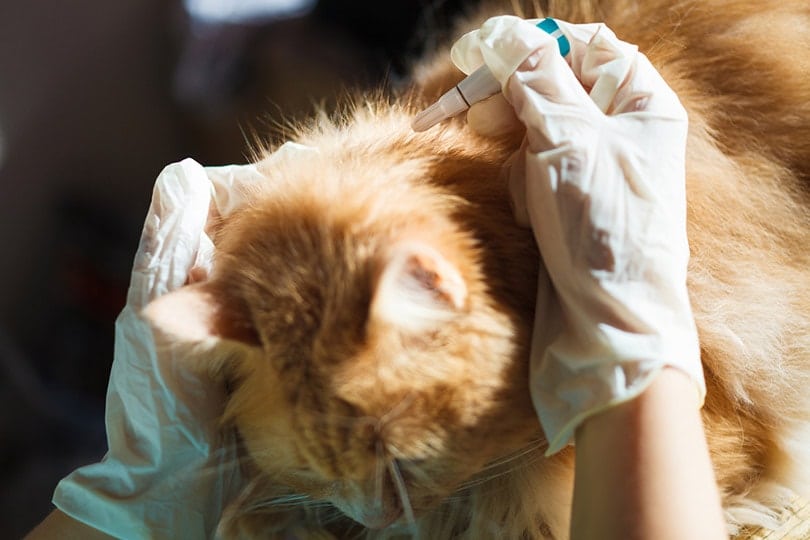Click to Skip Ahead
Deworming is a necessary treatment for cats infested with parasites. Parasites are common in cats as they can be spread in various ways, depending on the type. Thankfully, the treatment is safe and effective and only sometimes causes a day or two of uncomfortable symptoms like vomiting and diarrhea. After these signs resolve, your cat will feel a lot healthier.
Keep reading to learn more about the most common parasites found in cats, how to spot the symptoms, and what to expect from deworming.

Types of Parasites in Cats
Before deworming, your vet must first identify the type of parasite1 your cat is struggling with. If the wrong deworming medicine is used, it may be ineffective.
Tapeworms
Tapeworms are one of the most commonly found parasites in cats. Although they should still be treated, they rarely cause serious concerns in adults. However, they can be dangerous for kittens and lead to slow growth or permanent stunting. They must be transmitted by an intermediate host, meaning that another creature needs to transfer them to the cat. In most cases, the host is a flea.
Roundworms
Roundworms are another parasite that can severely affect a kitten’s ability to grow. They’re easily passed through the feces of another infested host They usually cause severe digestive upset and a noticeably bloated belly.
Hookworms
Hookworms can be the most dangerous parasite because they latch onto the intestinal wall and feed on the cat’s blood. If the infestation is severe or lasts a long time, it can lead to anemia which can be life-threatening.


Signs of Worm Infestation
Deworming kittens is standard practice, even if there are no signs of them yet. That is because many kittens have them, and it’s safe to assume yours will too. This safety measure ensures your cat continues growing long before you notice any outward signs that they have worms.
Knowing the potential signs of worms in older cats is essential to get them treated as soon as possible before severe health complications like anemia or malnutrition occur. What are the signs of a worm infestation in cats1?
- Weight loss
- Change in bowel habits
- Visible worms in feces or around their anus
- Dragging their bottom on the carpet
- Lethargy
- Course or dull fur

The Deworming Process
Your veterinarian will need a stool sample to check for the presence of worms and determine how to treat the parasites1 based on what kind they are. This will help them choose the best deworming medication to use. They may also prescribe a drug that fights several types of worms.
Depending on the type and severity of the infestation, they will administer the initial dose at the clinic with instructions to return for additional ones or send you home with medication to administer yourself on a precise schedule. This is because a dewormer may not remove the parasite larvae. Larvae will hatch into worms, which must be treated with a second or third dose. Be sure to follow your vet’s instructions to ensure your cat is completely free of parasites.


Deworming Side Effects
Because these medications are designed to flush out harmful parasites in your cat, you can potentially expect some deworming side effects1. Vomiting and diarrhea usually stop within 24 hours but may take up to 3 days to fully resolve.
If you are ever concerned about your cat’s reaction, notify your vet. They may suggest an over-the-counter remedy for diarrhea.


Cat Worms & Humans
Some cat parasites can be transmitted to humans but typically affect us differently. For example, hookworms usually burrow under the skin and cause intense itching that may lead to infection.
Children and those with compromised immune systems, including the elderly, may be more susceptible to feline parasites. Cats showing signs of a parasite infestation should be treated as soon as possible, and precautions should be taken to disinfect the home1 to prevent the transfer to humans.

Parasite Prevention
Thankfully, there are steps you can take to prevent worms1. This avoids the hassle of treating worms and gives you peace of mind that your cat will remain healthy and happy. Because fleas spread common parasites, proper flea prevention is vital. Some flea management medications also protect against worms and even ear mites. If you have an outdoor cat, you may want to have them dewormed as a precaution on a regular schedule to keep from spreading worms to other pets and people in the home.
We recommend you consult a veterinarian for the best advice on which would be the best treatment for your cat.
If you need to speak with a vet but can't get to one, head over to PangoVet. It's an online service where you can talk to a vet online and get the advice you need for your pet — all at an affordable price!

Conclusion
If you have a kitten that has not yet been dewormed, you should keep them isolated from other pets and give them their litterbox to ensure they don’t spread parasites. Even adult cats are not immune to worms, however. Cats showing signs of worms should see their vet as soon as possible. Because these medications are safe and effective, deworming can be done to treat an active infestation of worms or as a preventative measure to keep from transmitting them.
Whatever the reason for deworming, it’s essential to know that any side effects your cat experiences, like diarrhea, will be short-lived and well worth the benefits of the treatment. Be sure to deworm your kitty only with the guidance of a veterinarian.
Featured Image Credit: Lightspruch, Shutterstock











